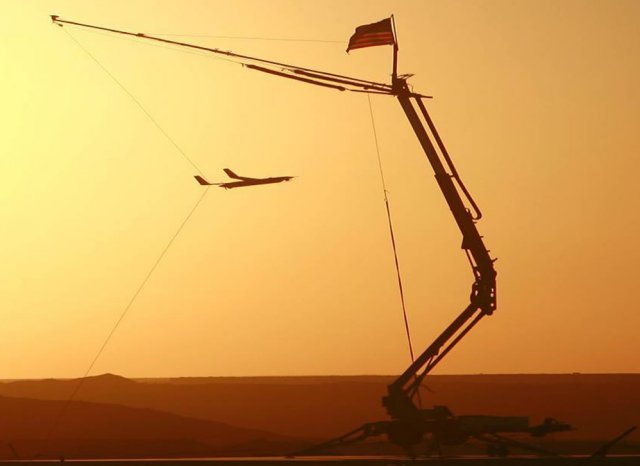A member of the famous McDonnell aerospace family is suing Boeing, the company that acquired McDonnell Douglas in 1997, alleging that the aircraft maker infringed on his patents related to an unmanned aircraft landing system.
William “Randy” McDonnell is seeking $160 million in damages from Boeing Co. and Insitu, Boeing’s Washington state subsidiary that produces unmanned aircraft for the Hazelwood-based Boeing Defense, Space and Security division. Boeing denied the allegations, saying it would fight the lawsuit.
Randy McDonnell, an aeronautical engineer, is the son of Sanford McDonnell who served as chief executive and chairman of McDonnell Douglas from 1972 to 1988. He is also a cousin of another former McDonnell Douglas chief executive and chairman – John McDonnell, who guided the corporation through its merger with Boeing. John McDonnell still holds a seat on Boeing’s board of directors.
The suit was filed Thursday in U.S. District Court in St. Louis by Advanced Aerospace Technologies Inc., which is owned by Randy McDonnell. The suit claims Boeing and Insitu knowingly encroached the patent McDonnell obtained for a “skyhook retrieval system” that enables unmanned aircraft to set down without a runway.
The technology is similar to the tail-hook mechanism that snags incoming manned jets on the decks of aircraft carriers, the suit says.
Randy McDonnell invented the process in the capacity of president and sole owner of Advanced Aerospace, an independent St. Louis County research and developmental engineering firm he founded prior to the Boeing merger, according to the filing. He continues to operate the company to this day.
“I am greatly disappointed that Insitu, and then Boeing, declined to pay the compensation due for their use of my inventions and that I now must resort to court action,” McDonnell said in a statement issued through his Washington attorney, Craig S. King.
In a companion lawsuit filed in the U.S. Court of Federal Claims in Washington, McDonnell is also seeking remuneration from the federal government. The District of Columbia filing asks the U.S. to reimburse McDonnell for profits Insitu and Boeing earned as independent contractors operating unmanned aircraft on behalf of the U.S. military.
Both suits stem from engineering designs developed by Randy McDonnell in the 1990s. The patents, owned by his company, were eventually issued in 2005 and again in 2006. The lawsuit said McDonnell shared details of the design in 2000 upon learning that Insitu, then known as the Insitu Group, had encountered “difficulties” with its own retrieval system. At the time, the patent was pending.
A leader in the development and production of unmanned aircraft, Insitu produces the Boeing ScanEagle, Integrator and other unmanned aircraft currently deployed by not only behalf of the U.S. but the military forces of Australia and Canada as well.
“Without advising Mr. McDonnell, Insitu misappropriated critical features of Mr. McDonnell’s UAV retrieval solution … for use on the Insitu (unmanned aircraft systems),” the legal papers alleged.
The suit also claims that Insitu induced McDonnell to delay enforcement of the patents until the company’s sale to Boeing was finalised. Boeing purchased Insitu in 2008.
“Insitu’s decision to incorporate Mr. McDonnell’s inventions in its systems gave Insitu a major advantage in the industry,” the suit says. The filing additionally accuses Boeing of ignoring warnings of possible patent infringement that Advanced Aerospace sent prior to the Insitu acquisition.
King, McDonnell’s attorney, said his client took legal action after failing to resolve the dispute with Boeing and Insitu out of court. Boeing declined to comment on the specifics of the case, citing pending litigation.
“We believe our products don’t infringe on the patents in question and believe the court will agree with us,” spokesman John Dern said from Boeing corporate headquarters in Chicago.
King noted McDonnell refrained from filing an injunction that would have blocked Boeing and Insitu from further using the retrieval system until the matter is played out in court. “The safety of our war fighters and performance of military missions is of paramount concern to (Advanced Aerospace), and neither will be affected by these lawsuits,” King said in a statement.
Source: STL Today

